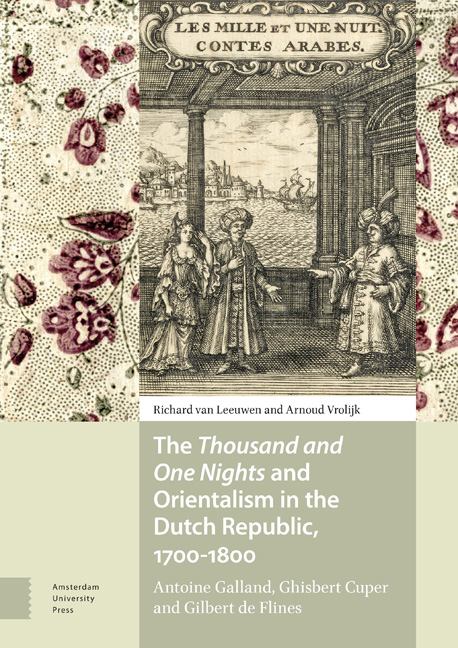 Thousand and One Nights and Orientalism in the Dutch Republic, 1700–1800
Thousand and One Nights and Orientalism in the Dutch Republic, 1700–1800 Book contents
- Frontmatter
- Contents
- Introduction
- 1 The Thousand and one nights and literary Orientalism in Europe
- 2 Dutch Orientalism before 1700
- 3 Antoine Galland and Ghisbert Cuper
- 4 The early editions of the Nights
- 5 Gilbert de Flines
- 6 Later editions in the eighteenth century
- 7 Dutch Orientalism in the eighteenth century
- Conclusion
- Appendix 1 Bibliographic survey of Dutch editions, 1705-1807
- Appendix 2 The David Coster engravings
- Appendix 3 Text samples of the Dutch Nights
- Appendix 4 French and Dutch quotations
- Illustration credits
- Bibliography
- Index
7 - Dutch Orientalism in the eighteenth century
Published online by Cambridge University Press: 21 November 2020
- Frontmatter
- Contents
- Introduction
- 1 The Thousand and one nights and literary Orientalism in Europe
- 2 Dutch Orientalism before 1700
- 3 Antoine Galland and Ghisbert Cuper
- 4 The early editions of the Nights
- 5 Gilbert de Flines
- 6 Later editions in the eighteenth century
- 7 Dutch Orientalism in the eighteenth century
- Conclusion
- Appendix 1 Bibliographic survey of Dutch editions, 1705-1807
- Appendix 2 The David Coster engravings
- Appendix 3 Text samples of the Dutch Nights
- Appendix 4 French and Dutch quotations
- Illustration credits
- Bibliography
- Index
Summary
As we have seen above, Dutch Oriental studies in the seventeenth century were mainly confined to the domains of history and linguistics. This reflected a general trend in Europe, where Oriental scholars had only a marginal interest in fictional literature. As can be seen from the correspondence between Cuper and Galland, the stories of the Mille et une nuit were looked down upon and considered trivial, probably even more so in the Protestant Dutch Republic than in Catholic France. This began to change, at least to some extent, in the eighteenth century due to an increased interest in Oriental literature. Paradoxically, this went hand in hand with a fundamental reorientation of academic studies towards the study of Islam – or rather its refutation – and the use of Arabic in comparative Biblical philology.
In 1701, upon his nomination as professor of Oriental languages at the University of Utrecht, Adriaan Reland dedicated his inaugural address to the importance of the Persian language. Unfortunately, Reland never published anything in the domain of Modern Persian belles lettres, but he did write two lengthy treatises on Old or Middle Persian vocabulary in the second volume of his Dissertationes miscellaneae, published in Utrecht in 1707. Reland dedicated this volume to his learned friend Galland, with whom he shared an interest in numismatics and inscriptions. In 1710 this encouraged Antoine Galland, who was then well over sixty, to donate a couple of Persian manuscripts to Reland with minor poetical works. Thirty years earlier, when he was living in Istanbul, he had copied out the Persian text in his own hand and added his Latin translation. But now, he said, he trusted the text would be in better hands with Reland.
Reland remains famous not for his literary or linguistic interests but rather for his innovative approach to Islam. In 1705 he published a short compendium of the tenets of Islam entitled De religione Mohammedica, which was followed by an expanded version in 1717. The work was translated into French, English, German and Dutch and gained renown as the first objective, scholarly description of Islam. For Reland, as for other Protestant scholars, Islam could only be effectively refuted on the basis of an objective and scholarly evaluation of its doctrines, based on the original Arabic material.
- Type
- Chapter
- Information
- Thousand and One Nights and Orientalism in the Dutch Republic, 1700–1800Antoine Galland, Ghisbert Cuper and Gilbert de Flines, pp. 103 - 132Publisher: Amsterdam University PressPrint publication year: 2019


